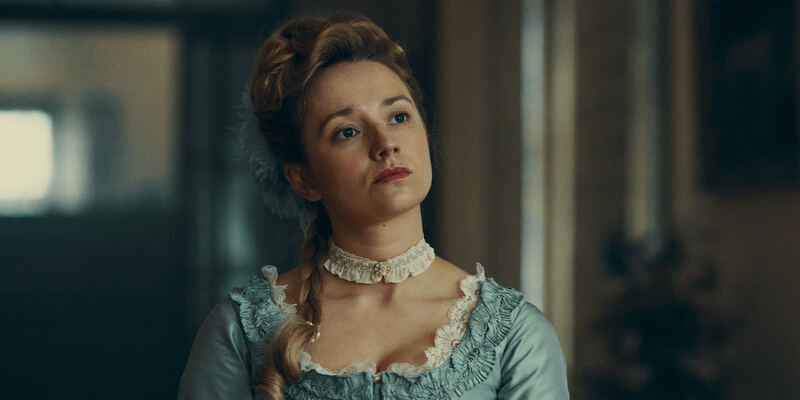
Review by
Eric Hillis
Directed by: Nikolaj Arcel
Starring: Mads Mikkelsen, Simon Bennebjerg, Amanda Collin, Kristine Kujath Thorp, Gustav Lindh

The Promised Land is the kind of movie that makes us
exclaim "They don’t make 'em like that anymore." It's a hybrid of sorts
of two once dominant but currently unfashionable genres – the western
and the historical epic – and it will remind you of why such movies can
hold you in their thrall on a rainy Sunday afternoon.
Director Nikolaj Arcel and his co-writer
Anders Thomas Jensen (a prolific screenwriter who has turned his
hand to every genre conceivable) take inspiration from
Ida Jessen's book 'The Captain and Ann Barbara', a fictionalised
account of the story of Ludvig Kahlen, played here by that titan of
Danish cinema, Mads Mikkelsen, in what might be his finest
performance to date.

In 1755, Kahlen has just finished as 25-year stint in the army,
eventually reaching the status of Captain despite his lower class
background. We're told that a nobleman usually becomes a Captain within
months of joining the military, but for Kahlen it took decades. Kahlen
is himself obsessed with joining the nobility, and when the King becomes
determined to settle the Jutland heath, an area considered uninhabitable
due to its untamed soil, Kahlen sees this as his chance. The Royal court
laughs off his claims that he can tame the heath, but they figure if
they send Kahlen out to the desolate patch it will keep the King off
their backs.
Kahlen has a canny plan to grow potatoes on the heath, as they're known
to thrive in the harshest of conditions. Trouble is, he can't afford to
pay any workers to assist him. A local pastor (Gustav Lindh)
facilitates a solution in the form of Ann Barbara (Amanda Collin)
and Johannes (Morten Hee Andersen), a young couple who are in
hiding after fleeing the employ of an abusive landowner.
Kahlen's presence on the heath makes him an enemy of local toff Frederik
de Schinkel (Simon Bennebjerg), who claims to own all the land in
the territory without possessing any paperwork to back up such an
assertion. De Schinkel also happens to be the very same landowner from
whom Ann Barbara and Johannes are hiding. Kahlen's refusal to agree to
de Schinkel's terms of handing over half of whatever profits he makes,
along with the fugitive couple, makes him an enemy of de Schinkel, whose
methods become increasingly violent. There's also the awkwardness of de
Schinkel's cousin Edel (Kristin Kujath Thorp) having the hots for
Kahlen. De Schinkel hopes to marry Edel, who is a member of Norwegian
royalty.

It's a story Hollywood has told time and again, at least in the
20th century; that of a quiet man who just wants to get on with his life
but finds a rich asshole standing in his way.
The Promised Land distinguishes itself with both its
untapped Danish setting and the nuance it brings to such a simple
premise. Mikkelsen's Kahlen is by no means a straightforward hero. In
fact he's pretty damn unlikeable for a considerable stretch of the
narrative. He's initially a narcissist whose ambitions towards nobility
make him all too willing to exploit others like Ann Barbara and
Johannes, whom he refuses to pay, taking advantage of their desperate
situation. Attacked by an outlaw in the woods, he blows the man's head
off without hesitation. He even slaps a child, Anmai Mus (Melina Hagberg), a precocious gypsy girl who desperately wants a family of her own.
As the narrative progresses and Kahlen sees de Schinkel as
representative of the sort of life he's always aspired to, he begins to
question things. He softens up, forming a sort of surrogate family with
Ann Barbara and Anmai Mus. When the potato crop finally comes in and a
group of German settlers arrive, Kahlen's ambitious ruthlessness rises
to the surface once again.

What makes us remain on Kahlen's side, even when he's being a massive
dick, is the fact that de Schinkel is one of the most reprehensibly
awful screen villains to come along in quite some time. Bennebjerg is
delightfully caddish as the sort of mustache twirling fop Errol Flynn
might have run a blade through. Adding the "de" to his name to make
himself seem more noble, de Schinkel is highly irritated by Kahlen's
insistence on calling him simply Schinkel. We spend the movie rooting
for de Schinkel's comeuppance. We know it's coming, because that's
exactly the type of movie The Promised Land is (and
frankly, if de Schinkel didn't get his there would be riots in cinemas),
but the manner in which it comes about is a surprising and applause
worthy twist on how this sort of story tends to climax.
The Promised Land has everything you want from a
historical epic: compelling characters with interesting arcs; larger
than life performances; stunning cinematography and production design
that contrasts the harshness of the heath with the comfort and finery of
the de Schinkel estate; and lots of bloodshed. Seems they do still make
'em like this after all.

The Promised Land is on UK/ROI
VOD now.

